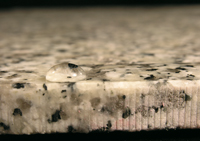
Technology
Glass
Nanotech now
Coating and daylighting options available in Canada
June 11, 2010 By Treena Hein
Whether glass is featured indoors or out, in commercial, institutional or residential buildings, it should be protected.
Whether glass is featured indoors or out, in commercial, institutional or residential buildings, it should be protected. A new option – a patented protective glaze called NanoPax – is now available in Canada. It restores and maintains the surface of new and existing glass and other surfaces from elements such as hard water stains, leaching, scratches and more.
 |
|
| Advanced Glazings Ltd. of Sydney, N.S., now offers its Solera insulated translucent curtain wall glass product with Nanogel Insulation, a synthetic amorphous silica gel. Shown here is the Detroit School of Arts, designed by Hamilton Anderson Associations Detroit. The product used here is Solera T, which looks identical to the new Solera+Nanogel.
|
NanoPax is a creation of Irvine, Calif.-based Diamon-Fusion International (DFI), a global developer of patented hydrophobic nanotechnologies. The NanoPax product delivers DFI protective coatings through a hand-applied, pre-portioned towelette, says Guillermo Seta, executive director of DFI Global Operations. (Diamon-Fusion coatings can also be applied through a chemical vapour deposition or spray-on liquid.) NanoPax can be used to treat glass and other silica-based surfaces such as tile, porcelain and granite.
“The frequency of application duration depends on the pre-coating method or condition,” says Seta. “Some surfaces may need a reapplication after a year, while some will last several years before a retreatment is needed, depending on how abrasive the surface is or how often it is cleaned.”
According to DFI, independent tests found the Diamon-Fusion coating in the NanoPax significantly more durable than most other products on the market. This, says Seta, is due to the strength of the covalent bond formed between the coating and the silica in the glass during application. At the same time, the coating is extremely thin – about 20 nanometres thick (a human hair is about 40,000 nanometres thick).
The strong durability of the product means that “over time, Diamon-Fusion is more cost effective,” Seta notes. In comparing the cost of hand-applied spray-on coatings, he believes having an understanding of how much surface area is treated is very important. “Diamon-Fusion covers more space than most other competitors,” he says. “In addition, some coatings are very reasonably priced, but require significant labour to apply or have lengthy cure times, requiring the just-coated glass to sit undisturbed before it can be handled or moved.” This requires additional inventory space.
NanoPax is being used throughout the world by companies such as DuPont, Alcoa and Moen in the United States, Curvet in Italy, and Grupo Navas in Spain. In Canada, Diamon-Fusion partners with authorized, licensed applicators who treat surfaces in their respective territories, such as House of Mirrors & Glass Ltd. in Calgary Alta. (a fabrication and supply glass products company) and Prelco in Rivière-du-Loup, Que. (the leading manufacturer of industrial, transportation and architectural safety glass in Canada and the northeastern United States). Prelco sales director Bill Marchitello says that, while his company does provide the NanoPax option, mostly “we apply the DFI coatings in a vacuum chamber as part of the glass fabrication process, which is most economical for us.” DFI is interested on an ongoing basis in partnering with more potential licensees in Canada.
New daylighting option
Advanced Glazings Ltd. of Sydney, N.S., now offers its Solera insulated translucent curtain wall glass product with Nanogel Insulation, a synthetic amorphous silica gel, allowing architects and building owners to incorporate more daylight and optimize building esthetics while substantially improving building efficiency and improving occupant comfort. Architectural Record magazine named Solera+Nanogel Insulation glass units a “2009 Product of the Year.”
Manufactured in Boston, Mass., Cabot Corporation’s Nanogel Insulation has a highly porous structure. “Nanogel Insulation is the lightest solid in the world, providing the highest thermal insulation per square inch of any product available,” notes Avi Bar, vice-president of architectural products at Advanced Glazings. “Including Nanogel Insulation into insulated glass units, such as Solera+Nanogel Insulation, gives architects the ability to incorporate glass into the building skin while saving the owner initial and ongoing costs.” This was previously not an option due to glass’s poor thermal performance, says Bar. “Having a glazing unit with a thermal performance that equates to a regular wall – yet still introduces full-spectrum natural diffused light – is a revolutionary way of building,” he observes.
The two products are combined by incorporating the Nanogel Insulation into Solera’s transparent honeycomb, “boosting the thermal performance of our already high Solera T product from R5 to R20,” notes Bar. “By filling the air cavity with Nanogel Insulation, the convection cycle is further inhibited. Each particle consists of about 90 per cent air contained in a nanostructure with pore sizes less than the average free-moving path of air molecules, which severely inhibits heat transfer through the material.”
Solera+Nanogel Insulation provides light transmission of 75 per cent per cm, reduced solar heat gain and reduced transmitted noise. In terms of thermal conductivity, it provides an R-value of 8 per inch, and a U-value of 0.71 W/m2K. “It resists colour change, mould and mildew, and performance degradation,” says Bar. “In addition, it’s a ‘green’ product with a ‘green’ manufacturing process.”
Like other Solera products, Solera+Nanogel Insulation can be used in a window or curtain wall application. In comparison with quadruple glazings (with White PVB Interlayer on each lite, Krypon and Low-e on three lites of glass; overall thickness 2.2 inches), Solera+Nanogel Insulation offers the same level of visual light transmittance and SHGC (solar heat gain coefficient) with an R-Value of 17 versus 11.7. “There is the perception that a product like Solera+Nanogel Insulation must be expensive and therefore out of reach, but it costs $60 per square foot compared to $100 per square foot for quadruple glazings,” notes Bar. “This higher efficiency reduces the heating and cooling load of the building substantially and so HVAC systems can be downsized, providing initial and ongoing cost savings.” Initial installation costs are also saved due to the light weight – six pounds per square foot versus eight.
The installation process is no different from that of standard Solera products, which is no different from installing any insulated glass unit in window or curtain wall applications, says Bar. There are no maintenance considerations over and above regular insulated glass units.
Advanced Glazings has an unprecedented booking demand since the product became available in November 2009, Bar notes. “We have in excess of six-figure square footage currently booked for delivery.” Projects that will incorporate Solera+Nanogel Insulation are so far located in Canada, the United States, Norway and China.
| MORE RESOURCES
www.DFInanotechnology.com |
Print this page
 Nanofusion and other nanoscale technologies have great promise for the glass, window, and general building industries. A s we move into the future, these technologies will begin to play an ever expanding role for everyone involved in the business. For more information, please visit the following links:
Nanofusion and other nanoscale technologies have great promise for the glass, window, and general building industries. A s we move into the future, these technologies will begin to play an ever expanding role for everyone involved in the business. For more information, please visit the following links:
Leave a Reply